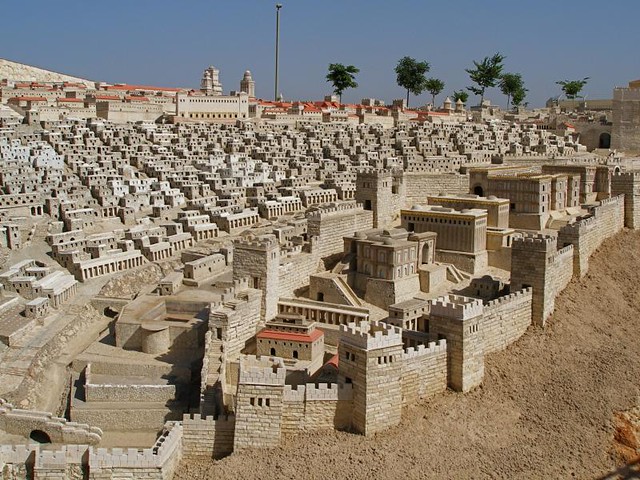Blog
Summaries, Psalms 67-70
Monday, July 08, 2019

Psalm 67 calls all the nations to praise God. It begins with an appeal to God to bless Israel so that all other nations can recognize His power. This will give them reason to praise Him, an idea that is repeated as a “chorus” throughout the psalm. The psalmist continues to observe that the nations should rejoice in God because He judges them righteously and guides them. The psalm concludes by celebrating the recent good harvest and observing that God’s blessing of His people gives the nations reason to fear Him.
Psalm 68 is a war song written by David, probably as the Israelites are about to leave Jerusalem to fight against enemies from Bashan (northeast of the Sea of Galilee). It opens by describing the totality of God’s victory over His enemies. He will crush the wicked, and the righteous will praise Him for it. He blesses the humble and provides rain for His people, but the rebellious will suffer drought.
From there, the focus shifts to the Israelite women (probably actual women in this assembly) who will rejoice in the good news and spoils of battle. David then contrasts the rebellious mountain of Bashan with Mount Zion, where God dwells and leads His people victoriously (note that 68:18 is quoted in Ephesians 4:8). He anticipates that God will completely defeat the rebels from Bashan.
After this, we see a recounting of the parade that is passing out of the gates of Jerusalem as the psalm is being sung: singers and musicians, then contingents from Benjamin, Judah, Zebulun, and Naphtali. The closing portion of the psalm appeals to God to punish the warmongers who have started this conflict, then calls all nations to praise Him.
Psalm 69 is another Davidic psalm, but is about a time of trouble instead. In it, David compares his troubles to a flood. His problem is the numerous people who hate him though he has done nothing wrong. As a result, he appeals to God to punish them instead.
From there, David laments all of his troubles and says that their source is his devotion to God. His enemies laugh at his godliness, but David continues to pray to God for help. He pleads to God to rescue him and points out all the bad treatment he has received. He asks God to return his tormentors’ malice on their own head. He promises that if God will do this, he will praise Him and call all the earth to do likewise.
Many portions of this psalm prophetically anticipate the suffering of Jesus and are applied to Him in the New Testament, particularly vs. 4, 9, 21, and 25.
Psalm 70 is similar in content to its predecessor. Once again, David is in trouble and wants God to deliver him and punish those who hate him. In comparison, David asks for God to give those who seek Him reason to rejoice. The psalm concludes with a plea for God to help him quickly.
Doing All Things Through Christ
Friday, July 05, 2019

There are some texts of Scripture that it seems nearly everyone knows. They’ve made the leap to become part of popular culture. One such text is the punch line to Philippians 4:11-13. Our society idolizes success, and Philippians 4:13 appears to promise success in everything because Jesus will help. I can remember my high school’s Fellowship of Christian Athletes putting Philippians 4:13 on T-shirts. My wife’s childbirth-class instructor suggested that women might want to repeat Philippians 4:13 when they were in labor, and so on.
All of that was very inspiring, no doubt, but is it really what the passage is about? Is Paul telling us that Jesus is the gateway to achieving our earthly goals, or is his point different? Here, as always, we need to tune out the cultural noise and ask what the Scriptures truly are saying. Let’s turn our attention, then, to some passages that will help us understand what it means to do all things through Christ.
When we are determining whether Philippians 4:13 applies to what we are doing, we first must EVALUATE OUR GOAL. Paul offers us a useful template for so doing in Colossians 3:1-2. Notice that the distinction here isn’t between setting our minds on righteous things instead of things that are sinful. It’s between setting our minds on things above instead of things that are on the earth. This is important because it tells us that there are goals that aren’t sinful that are still earthly. It’s OK for Christians to have goals like that, but they shouldn’t be where our minds are set.
This is the problem with applying Philippians 4:13 to scoring touchdowns or delivering children. Contextually, the passage isn’t about being able to do whatever we want to because Jesus gives us superpowers. It’s about doing what He wants us to do through the strength that He provides.
In context in Philippians 4, Paul is not being given the strength to succeed. He’s being given the strength to endure. Jesus is helping him to be content despite not even having enough money to eat so that he can go on spreading the gospel. That’s not something that most Americans would recognize as a success, but it was something that brought Paul closer to Christ.
So too for us. Again, it’s fine for Christians to pursue earthly achievements, but those things should not be the pursuit of our lives. Athletic success is fine, but not important. Career success is fine, but not important.
Instead, we ought to be concerned with the triumphs of the spirit. How am I doing in my battle against secret sin? Am I becoming more compassionate and merciful in my dealings with others? Am I, like Paul, patiently enduring suffering for the Lord’s sake? Those are the things that we should be looking to accomplish through the strength that Christ gives us. They never will shine on our resumes, but they are the kinds of things that get recorded in the book of life.
Second, we ought to PRAY FOR BOLDNESS. Consider the example of the apostles in Acts 4:29-31. Contextually, this is impressive. In the previous chapter, Peter and John had been arrested for healing a lame man—for doing good! They have been released from custody only after the leaders of their nation have warned them that if they continue to proclaim Jesus, they will suffer for it. What do they do? They come together with their friends and pray for boldness to continue preaching.
Here, I think we come to the difference between FCA-style leaning on Jesus and Bible-style leaning on Jesus. Usually, the pop-culture version of Philippians 4:13 is about ability. God, help me run faster. God, help me make better business decisions.
By contrast, the Bible version of Philippians 4:13 tends to be about commitment to Christ. We know what we should do. We have the physical and mental abilities to do it. However, there is some part of us that is afraid, so we need Christ’s help to do it.
This is obvious when it comes to serving the Lord—with evangelism, for instance. We know how fear can cripple us then, can keep us from doing what we know is right. However, the same is often true of our struggles against sin. If there is some sin that is constantly present in our lives, be it porn, alcoholism, or gossip, we physically could quit. However, we’re afraid to. We are comfortable in our sin, and we allow our minds to dwell on how unpleasant life would be without it.
In both of these cases, prayers for boldness are the answer. We don’t need stronger quadriceps or stronger brains. We need stronger hearts. We need the Lord’s help to do what we know we need to do.
Once we recognize that need, we should ask for help constantly. Prayer is not supposed to be a one-and-done thing. It is supposed to be a constant thing, especially in the times when we are tempted to be less than we should be. If we turn to Jesus, He will make us strong.
Finally, we must BE STRONG AND ACT. Look at the exhortation recorded in Ezra 10:2-4. Again, this is significant in context. Ezra has only just arrived in Jerusalem. Immediately, though, he has been confronted with a spiritual disaster of epic proportions. The Jews again have begun intermarrying with foreign women, even though that was one of those things that got them carried off into captivity in the first place! Worse still, the leaders of the people, those who were supposed to be leading them in righteousness, instead have been foremost in sin.
Somebody has to do something, and that somebody is Ezra. Nobody else has the same understanding of the Law that Ezra does. Nobody else is in the same elevated position. If he does not act, it may be that the Jews will be carried off into another captivity, never to return to the land.
The same holds true for us. There will be times in our lives when we are called on to take a stand. The stand could be in private, a defiant declaration that we are not going to practice that secret sin ever again. It could be in the context of our families, when somebody isn’t living right. It could be in our workplaces or even our churches.
However, wherever it takes place, the stand will be lonely. That’s what it means to take a stand. Rather than looking around sideways to see what everybody else is going to do, we do what we know we must and leave it to others to follow.
What Jesus wants us to know, though, is that when we are taking that stand, no matter how lonely it may feel, we never will be alone. He will be with us, and when we act with His strength, we will be certain to fully accomplish His will. Maybe the earthly results won’t be what we wanted, but in the spiritual realm, God will be glorified, and that’s what matters.
Psalm 48
Wednesday, July 03, 2019

The Lord our God is great
And greatly to be praised
In Zion, joy of all the earth,
Both holy and upraised.
Mount Zion, in the north,
The city where He dwells,
Is guarded by the might of God
Within her citadels.
Although the kings came on,
Assembled in their might,
They saw her with astonishment
And took to panicked flight.
The Lord destroys His foes;
We saw as we had heard,
And He will keep His city safe,
Established by His word.
We think upon Your love
And in Your name, rejoice;
Your hand is filled with righteousness;
Let Judah lift her voice!
Let all her rivals come
And count her walls and towers,
Secure and certain evermore,
Because the Lord is ours.
Summaries, Psalms 62-66
Tuesday, July 02, 2019

Psalm 62 is another psalm written by David in a time of trouble. He expresses his determination to wait on the Lord because the Lord’s protection is certain. Vs. 1-2 make up a “prelude” that is repeated in vs. 5-6. Vs. 3-4 explain David’s problem: he is attacked by people who want to overthrow him as king. However, he continues to trust in God and encourages others to do the same. He observes that trusting in earthly power isn’t as beneficial, so seeking for power and riches is pointless. Power will always belong to God, and He will judge rightly.
Psalm 63 expresses David’s longing for God. He compares his desire for God’s presence to longing for water in the desert. He loves to praise God and will be satisfied with the opportunity to praise Him. He even thinks about God in his bed at night. He has this regard for God because God has always protected him. He is confident that God will destroy his enemies and exalt him.
Psalm 64 addresses the problem of wicked men plotting against David. He compares their hateful speech to sharpened swords and arrows being shot from ambush. He notes that these are people who have invested a lot of thought in how best to be wicked and betray him.
However, as they are shooting their “arrows” at David, God will shoot His arrows at them. They will be destroyed by their own evil words so that mankind will learn from their example and the righteous will rejoice.
Psalm 65 is a song of praise to God. He deserves this praise because He answers prayer, forgives sin, and allows the righteous to come near to Him. He answers His people with awesome deeds, the same kind of power that He revealed in establishing the mountains and stilling the sea. As a result, people praise Him across the earth, and even the dawn and the sunset rejoice in Him.
God reveals His goodness by sending rain. This causes his people’s crops to grow abundantly. Even the wilderness and the hills are green, and the verdant landscape praises Him.
Psalm 66 calls the earth to glorify God. Even His enemies have to give Him glory, and worldwide, people worship Him. This praise is justified because of God’s revelation of His power in parting the Red Sea and the Jordan River so His people could cross. To this day, He continues to protect His people from the nations around them. Where once He allowed them to be enslaved, now He has blessed them with abundance.
Because of this, the psalmist is resolved to praise Him and offer sacrifices to Him. He wants everyone to know that God has answered his prayers because of his righteousness and God’s steadfast love.
Why Care About Teaching Our Children?
Monday, July 01, 2019

For our congregation, this is the time of year when we pay the most attention to teaching our children. There have been women meeting in the building for weeks working on various aspects of our upcoming vacation Bible school, and the week after that, we’ve got a quarter change coming up, with all the work that entails.
All this is quite demanding for those involved. It’s demanding for our teachers and resource-preppers, and it’s demanding for our parents too. Parents are the ones who have to clear their schedules to get their kids here for every night of VBS. Parents are the one who have to get their kids up early on Sunday morning and put them to bed late on Wednesday evening so they can be here for Bible class. We all know very well that given these stresses, it would be much easier not to help and participate.
Why should we participate anyway? What is it about the result that makes all this effort and stress worthwhile? In short, why should we care about teaching our children?
There are several Biblical answers to this question. The first, and in some ways the most important, reason that I want us to consider has more to do with us than it does with our kids. We should care about teaching them because IT REVEALS WHO WE ARE. Here, let’s look at Deuteronomy 6:4-9. This is a familiar text, but I must admit that until recently, I didn’t understand it as fully as I should have. I read it flatly, as a list of commandments. Commandment One was to love God. Commandment Two was to keep these words in our heart. Commandment Three was to teach them diligently. And so on.
However, that doesn’t reckon with Jesus’ statement in Matthew 22 that the whole Law depends on this commandment, along with the commandment to love our neighbor. We can’t understand Deuteronomy 6 as a laundry list of commandments. Instead, we need to connect every other commandment in this reading back to the commandment to love the Lord, and we need to understand each one as an expression of that love.
In other words, if we truly love the Lord with all our heart and soul and might, we won’t have to go down two verses and say, “Oops! Now we need to remember to diligently teach our children!” Instead, we will be diligently teaching our children already, because diligently teaching children is one of the things that people who love the Lord do.
To put things a different way, our devotion to teaching children is a litmus test for our devotion to God. If we don’t care about it, if we are unconcerned with telling the young about Him, that’s a serious heart problem, and it indicates the presence of a much more serious heart problem. Conversely, if we are filled with love for teaching children about God, it indicates a love for God too. Deuteronomy 6 does not allow us to separate those things, either in our families or in our churches. If we are the people we ought to be, teaching children will be important to us.
Additionally, this is an important matter because IT GUARDS AGAINST APOSTASY. Consider the sad tale of Judges 2:6-7, 9-11. This is the story of three generations. The first generation consisted of those who stood with Joshua and conquered Canaan with God’s help. The second generation was made up of those who were children at the time and saw all of God’s great work. The third generation, though, comprised those who had no direct experience of God’s deliverance. Once the elders who did have that direct experience died, the third generation that did not know God began to serve the Baals instead.
It’s interesting to note that since the Restoration, trouble has arisen in the Lord’s church on about this same time scale. 70 years after the Restoration, about the turn of the 20th century, a brotherhood-wide split occurred over the issues of instrumental music and missionary societies.
I don’t think this is coincidence. Instead, I think it’s the same pattern repeating itself. You have a generation that goes through some great conflict, a second generation that doesn’t participate much but sees it happen, and then a third generation without direct experience. The founders are faithful; their heirs are apostate.
The only cure for the disease is to make sure that children know the Lord. Even now, I see signs of failure in this. There are all too many young people around the country who are “raised in the church” who don’t know why we do what we do. They assume it’s a matter of human tradition rather than divine commandment. They don’t understand the importance of doing all in the name of the Lord because they have not been brought to encounter Jesus as Lord. Unless we are diligent to teach them with all the passion that Deuteronomy 6 implies, either history will repeat itself, or something even worse will happen.
Finally, investing ourselves in teaching matters because IT GLORIFIES GOD. We see how we ought to conduct ourselves when serving the Lord in 1 Peter 4:10-11. Whatever we have been given, we are to use it to serve one another, and we are to use it as well as we can. Only then will God receive the glory that He deserves.
Among other things, this should warn us against the dangers of apathy. It’s all too easy for us to go through the motions of doing the right thing without truly investing ourselves in it.
We see this problem unfolding in the first chapter of Malachi. There, the returned exiles are offering to God blemished sacrifices that they never would dare to give to their governor. In response, God expresses the wish that someone would shut the doors of the temple rather than allowing such halfhearted service to go on.
Today, we know all too well what it looks like when parents and Bible-class teachers are going through the motions rather than giving their best. In situations like this, no one is prepared. The children haven’t done their lessons, and the teacher is frantically rummaging around in bins in the resource room 15 minutes before class starts trying to piece together a craft.
No adults involved have put much thought into the class. They’ve acted like it’s not important, and from this, the children involved will draw the conclusion that it shouldn’t be important to them either.
That, brethren, is what a blemished sacrifice in the classroom looks like. Sure, the lights are on and everybody’s there, but the zeal that should animate each participant is absent. In a time as troubled as ours is, our children need more from us than that. In any time, God deserves better from His people than that.
If we want our classes to be effective, we have to give them our best. This doesn’t mean that every Bible-class teacher has to be the most wonderful teacher in the world. We all have our limits. It does mean, though, that we will be pushing those limits. If we do, our effort will communicate the importance of God to the children we teach more clearly than anything we say.


